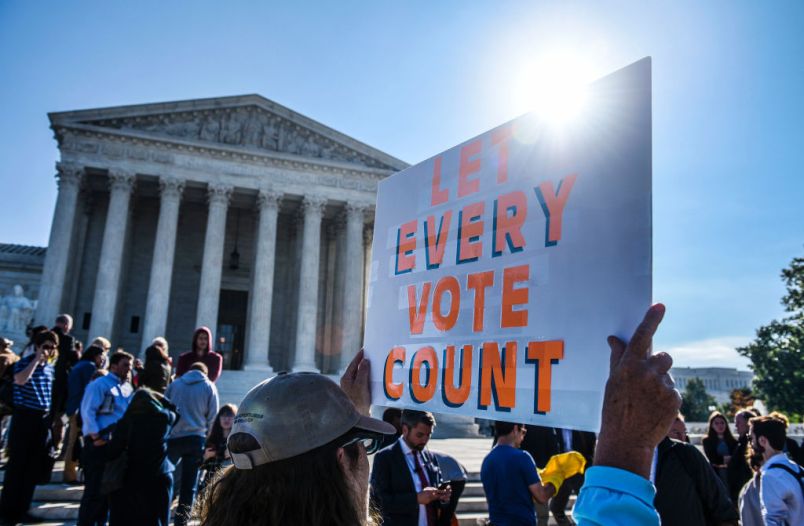HARRISBURG, Pa. (AP) — New proposals to redraw Pennsylvania’s congressional districts rolled in Thursday in a high-stakes gerrymandering case, meeting a court-ordered deadline to submit maps of boundaries for the state Supreme Court to consider adopting for this year’s election.
Pennsylvania’s House Democrats and Senate Democrats each submitted a plan Thursday, as did a group of Republican activists who intervened in the case. The registered Democratic voters who sued successfully to invalidate the current map planned to submit a map and Democratic Gov. Tom Wolf may also. Each can submit as many suggested maps as they like.
Pennsylvania Democratic legislators countered with this congressional map (PDF):https://t.co/OUfprKaw3S
State Supreme Court will adopt new map if legislature (R) & governor (D) don't meet deadline today pic.twitter.com/lxls9nX4Mj— Greg Giroux (@greggiroux) February 15, 2018
And here's a map proposed by Pennsylvania Republican activists ("Intervenors" in legalese): pic.twitter.com/6CsoRmeUsQ
— Greg Giroux (@greggiroux) February 15, 2018
Pennsylvania Senate Democratic Caucus congressional map proposal: pic.twitter.com/OcbfYR1eyb
— Greg Giroux (@greggiroux) February 15, 2018
The midnight deadline gives justices four more days to impose new boundaries under a timeline the divided court set to keep May’s primary election on schedule.
Pennsylvania’s congressional map — drawn by Republicans to get Republicans elected — is widely viewed as among the nation’s most gerrymandered. Upending it could boost Democrats nationally in their quest to capture control of the U.S. House and dramatically change the state’s predominantly Republican, all-male delegation. Meanwhile, sitting congressmen, dozens of would-be candidates and millions of voters could find themselves in different districts.
Republican lawmakers say they will swiftly ask federal judges to block a new map, and contend that the Democratic-majority court had no power to invalidate the congressional boundaries or draw new ones.
The court will be advised by Stanford University law professor Nathan Persily, who has assisted judges drawing districts in North Carolina, New York, Connecticut, Georgia and Maryland. The justices could pick a submitted map, or rely on Persily to draw one.
Pennsylvania’s Republican Senate majority leader, Jake Corman, on Thursday warned anew that the tight timeline would create chaos in Pennsylvania’s congressional primaries, and the court-ordered process would unconstitutionally usurp the role of the governor and Legislature.
“We’re going to have a Stanford professor come into Pennsylvania,” Corman said. “He’s going to act as the prosecutor by presenting the evidence, he’s going to act as the juror by evaluating the evidence and he’s solely going to act as a judge by ultimately ruling on the evidence and produce a map, one person, to the court for the people of Pennsylvania to live under.”
Corman also attacked Wolf for backing the court, saying Wolf’s “loyalties to the Democrat National Committee and making Nancy Pelosi the speaker of the House is more important than his loyalties to the Pennsylvania Constitution.”
Leaders of the state Legislature’s huge Republican majorities submitted a map Friday, although Wolf rejected it, saying it was as gerrymandered as the 6-year-old map it would replace.
That map, crafted by Republicans who controlled the Legislature and governor’s office after the 2010 census, succeeded in its aim: Republicans won 13 of 18 seats in three straight elections, even though Pennsylvania’s statewide elections are often closely divided and registered Democratic voters outnumber Republicans.
In drawing it, Republicans broke decades of precedent and created bizarrely shaped districts in what Franklin and Marshall College political scientist G. Terry Madonna called “the worst gerrymander in modern Pennsylvania history.”
The court threw it out last month, saying it unconstitutionally put partisan interests above other line-drawing criteria, such as eliminating municipal and county divisions and keeping districts compact.
The revised map Republicans submitted reduced splits and ironed out some of the most contorted boundaries. It also kept nearly 70 percent of residents — and every congressman — in their old districts in what Republicans called an effort to minimize disruption, although it shifted key Democratic challengers into new districts and Wolf criticized it as keeping “nearly 70 percent of residents in districts the court found unconstitutional.”
The court gave no direction to protect incumbent lawmakers or to keep previous districts largely intact. Meanwhile, the NAACP wrote to Wolf and top lawmakers last week to warn against redrawing two Philadelphia-based districts to “disenfranchise the vast and robust communities of color.”







Wow, AP really works hard to avoid evaluating anyone’s claims for truth value.
The display of #1 is messed up, #2 is a bit peculiar (what’s that blue blob in the to left corner doing), so #3 looks the best.
This makes me dizzy. I’m glad there are judges who can make sense of these maps.
Those judges have been threatened with impeachment by the Rs.
Keeping districts compact, and cities intact, should be secondary and tertiary, compared to making every district as close to 50/50 as possible. Politicians should compete to represent the people who live here, and pay lip service to people who don’t. Not the other way around.